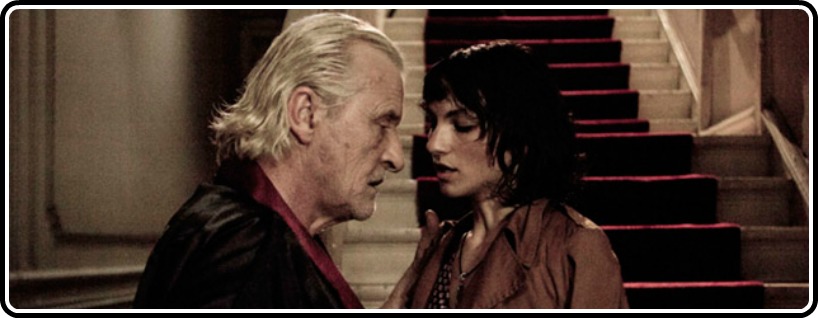With the summer film season now on the way out, and festivals like TIFF, Venice and Telluride now in full swing, it’s about time we start seeing feature films leaning a bit more towards the brainy side of the spectrum, instead of the brawny.
However, very few films you’ll find this fall film season will be as surreal and truly bewildering as the third feature from Chilean filmmaker Alicia Scherson, a breathtakingly singular adaptation of Roberto Bolano’s novel Una Novelita Lumpen entitled The Future (Il Futuro).
The picture introduces us to two young recently orphaned teens, named Bianca and Tomas. From the opening scene we are shown the details of the death of the two children’s parents, from a car crash. However, we are also, through really well toned and written narration, given information that launches us into a world not unlike a surreal sci-fi picture like Greg Arraki’s misunderstood and underrated masterpiece, Kaboom. In the couple’s accident, enough energy was released that the entire universe changed, even down to the color of their car.
Now, while that film itself sounds, from that logline, like a pretentious bit of Lynchian-science-fiction, what follows, with the introduction of an aging, seemingly lost former Mr. Universe and Italian sword-and-sandal film icon, this film turns into a beautifully shot and wondrously performed drama about being lost in a world that has seemingly forgotten all about you.
That former film legend is played by Rutger Hauer, giving what may be his best performance in ages. He plays a man known as Maciste, who was at one time ostensibly the star of Hercules type pictures we saw crop up from the likes of Mario Bava and Jess Franco years prior. With names like Maciste Versus The Living Dead, we are given the idea that these were minor B-pictures, but pictures that turned him into a star, allowing him to build a palace that is now as dead, or as dying, as the city it is located within and the star that it houses. Hauer gives a performance that is drenched in loneliness and sadness, and is a perfect counterpart to the equally melancholy performance given by young up and comer, and absolute find, Manuela Martelli. She herself plays Bianca, our lead, a young woman dealing with not only her budding sexuality, but the idea of being completely alone in a world that she truly can’t comprehend the size of. The two are quick to hit it off, and they become increasingly close, until Bianca begins feeling something that she’s never felt before; love. There is a sense of tone and mood here that is so deft that it is the stuff of filmmakers twice Scherson’s age.
Also, aesthetically, the film is quite superb. Owing a lot to the films of Araki or, more so, the erotic psycho-dramas of say, Jean Rollin, the film oozes a sense of sexuality that is not so much overtly sexy as it is utterly erotic. Icy cold in its photography and quiet in its actual use of the camera, the film comes across as a film as plaintive as it is bluntly erotic, and thankfully, both turn this film into something of a wonder. The style here turns the film into a 70s era erotic drama that a Jess Franco type of filmmaker would have loved to have made, while the film’s brains turn it into something of a touching meditation on loneliness that is as inspired as it is truly affecting. There is a dash of comedy thrown in too (particularly in the first quarter of the picture, especially in the scenes involving Bianca’s brother’s attempt at turning their TV into a free porn box), but this is mostly a deeply intimate and resonant drama about two people finally finding one another in a world they once thought neither could possibly inhabit.
Overall, while the film’s seemingly pretentious inclusion of some somewhat silly sci-fi touches may turn some viewers off, as will the film’s lyrical pacing, The Future is possibly the best film you’ll see all month. A resonant piece of drama touching at the ever so human sense of isolation in such a giant world, Scherson’s drama (in theaters starting this very Friday) is one of the many small independent and foreign language films that may be forgotten about by mainstream audiences. However, with a summer film season now completed, one that was as bombastic and laughably self-important as any we’ve ever seen, this is just about as perfect a real, viscerally affecting palette cleanser as you’ll fine. With brilliant lead performances and a filmmaker working at the very top of her game, this is a film not to be missed.




![Bergman Island (The Criterion Collection) [Blu-ray]](https://criterioncast.com/wp-content/uploads/2022/11/bergman-island-the-criterion-collection-blu-ray-400x496.jpg)
![This Is Not a Burial, It’s a Resurrection (The Criterion Collection) [Blu-ray]](https://criterioncast.com/wp-content/uploads/2022/11/this-is-not-a-burial-its-a-resurrection-the-criterion-collection-blu-ray-400x496.jpg)
![Lars von Trier's Europe Trilogy (The Criterion Collection) [The Element of Crime/Epidemic/Europa] [Blu-ray]](https://criterioncast.com/wp-content/uploads/2022/11/lars-von-triers-europe-trilogy-the-criterion-collection-the-element-of-400x496.jpg)
![Imitation of Life (The Criterion Collection) [Blu-ray]](https://criterioncast.com/wp-content/uploads/2022/11/imitation-of-life-the-criterion-collection-blu-ray-400x496.jpg)
![The Adventures of Baron Munchausen (The Criterion Collection) [4K UHD]](https://criterioncast.com/wp-content/uploads/2022/11/the-adventures-of-baron-munchausen-the-criterion-collection-4k-uhd-400x496.jpg)
![Cooley High [Criterion Collection] [Blu-ray] [1975]](https://criterioncast.com/wp-content/uploads/2022/11/cooley-high-criterion-collection-blu-ray-1975-400x496.jpg)